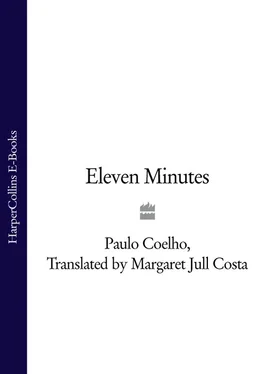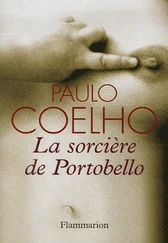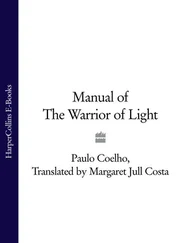One morning, on the way to school, the boy came up to her and asked if he could borrow a pencil. Maria didn’t reply; in fact, she seemed rather irritated by this unexpected approach and even quickened her step. She had felt petrified when she saw him coming towards her, terrified that he might realise how much she loved him, how eagerly she had waited for him, how she had dreamed of taking his hand, of walking straight past the school gates with him and continuing along the road to the end, where – people said – there was a big city, film stars and television stars, cars, lots of cinemas, and an endless number of fun things to do.
For the rest of the day, she couldn’t concentrate on her lessons, tormented by her own absurd behaviour, but, at the same time, relieved, because she knew that the boy had noticed her too, and that the pencil had just been an excuse to start a conversation, because when he came over to her, she had noticed that he already had a pen in his pocket. She waited for the next time, and during that night – and the nights that followed – she went over and over what she would say to him, until she found the right way to begin a story that would never end.
But there was no next time, for although they continued to walk to school together, with Maria sometimes a few steps ahead, clutching a pencil in her right hand, and at other times, walking slightly behind him so that she could gaze at him tenderly, he never said another word to her, and she had to content herself with loving and suffering in silence until the end of the school year.
During the interminable school holidays that followed, she woke up one morning to find that she had blood on her legs and was convinced she was going to die. She decided to leave a letter for the boy, telling him that he had been the great love of her life, and then she would go off into the bush and doubtless be killed by one of the two monsters that terrorised the country people round about: the werewolf and the mula-sem-cabeça (said to be a priest’s mistress transformed into a mule and doomed to wander the night). That way, her parents wouldn’t suffer too much over her death, for, although constantly beset by tragedies, the poor are always hopeful, and her parents would persuade themselves that she had been kidnapped by a wealthy, childless family, but would return one day, rich and famous, while the current (and eternal) love of her life would never forget her, torturing himself each day for not having spoken to her again.
She never did write that letter because her mother came into the room, saw the bloodstained sheets, smiled and said:
‘Now you’re a young woman.’
Maria wondered what the connection was between the blood on her legs and her becoming a young woman, but her mother wasn’t able to give her a satisfactory explanation: she just said that it was normal, and that, from now on, for four or five days a month, she would have to wear something like a doll’s pillow between her legs. Maria asked if men used some kind of tube to stop the blood going all over their trousers, and was told that this was something that only happened to women.
Maria complained to God, but, in the end, she got used to menstruating. She could not, however, get used to the boy’s absence, and kept blaming herself for her own stupidity in running away from the very thing she most wanted. The day before the new term began, she went to the only church in town and vowed to the image of St Anthony that she would take the initiative and speak to the boy.
The following day, she put on her smartest dress, one that her mother had made specially for the occasion, and set off to school, thanking God that the holidays had finally ended. But the boy did not appear. And so another agonising week passed, until she found out, through some schoolfriends, that he had left town.
‘He’s gone somewhere far away,’ someone said.
At that moment, Maria learned that certain things are lost forever. She learned too that there was a place called ‘somewhere far away’, that the world was vast and her own town very small, and that, in the end, the most interesting people always leave. She too would like to leave, but she was still very young. Nevertheless, looking at the dusty streets of the town where she lived, she decided that one day she would follow in the boy’s footsteps. On the nine Fridays that followed, she took communion, as was the custom in her religion, and asked the Virgin Mary to take her away from there.
She grieved for a while too and tried vainly to find out where the boy had gone, but no one knew where his parents had moved to. It began to seem to Maria that the world was too large, that love was something very dangerous and that the Virgin was a saint who inhabited a distant heaven and didn’t listen to the prayers of children.
Three years passed; she learned geography and mathematics, she began following the soaps on TV; at school, she read her first erotic magazine; and she began writing a diary describing her humdrum life and her desire to experience first-hand the things they told her about in class – the ocean, snow, men in turbans, elegant women covered in jewels. But since no one can live on impossible dreams – especially when their mother is a seamstress and their father is hardly ever at home – she soon realised that she needed to take more notice of what was going on around her. She studied in order to get on in life, at the same time looking for someone with whom she could share her dreams of adventure. When she had just turned fifteen, she fell in love with a boy she had met in a Holy Week procession.
She did not repeat her childhood mistake: they talked, became friends and started going to the cinema and to parties together. She also noticed that, as had happened with the first boy, she associated love more with the person’s absence than with their presence: she would miss her boyfriend intensely, would spend hours imagining what they would talk about when next they met, and remembering every second they had spent together, trying to work out what she had done right and what she had done wrong. She liked to think of herself as an experienced young woman, who had already allowed one grand passion to slip from her grasp and who knew the pain that this caused, and now she was determined to fight with all her might for this man and for marriage, determined that he was the man for marriage, children and the house by the sea. She went to talk to her mother, who said imploringly:
‘But you’re still very young, my dear.’
‘You got married to my father when you were sixteen.’
Her mother preferred not to explain that this had been because of an unexpected pregnancy, and so she used the ‘things were different then’ argument and brought the matter to a close.
The following day, Maria and her boyfriend went for a walk in the countryside. They talked a little, and Maria asked if he wanted to travel, but, instead of answering the question, he took her in his arms and kissed her.
Her first kiss! How she had dreamed of that moment! And the landscape was special too – the herons flying, the sunset, the wild beauty of that semi-arid region, the sound of distant music. Maria pretended to draw back, but then she embraced him and repeated what she had seen so often on the cinema, in magazines and on TV: she rubbed her lips against his with some violence, moving her head from side to side, half-rhythmic, half-frenzied. Now and then, she felt the boy’s tongue touch her teeth and thought it felt delicious.
Then suddenly he stopped kissing her and asked:
‘Don’t you want to?’
What was she supposed to say? Did she want to? Of course she did! But a woman shouldn’t expose herself in that way, especially not to her future husband, otherwise he would spend the rest of his life suspecting that she might say ‘yes’ that easily to anything. She decided not to answer.
Читать дальше






